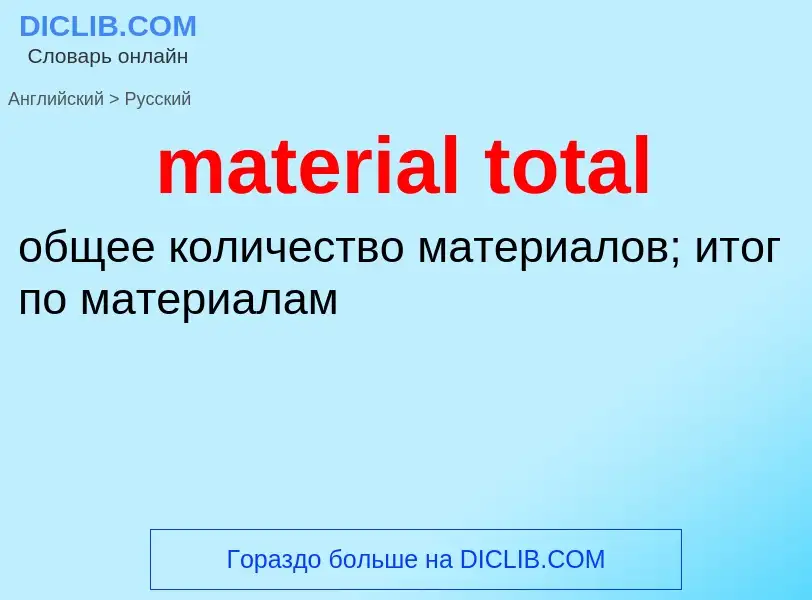Перевод и анализ слов искусственным интеллектом ChatGPT
На этой странице Вы можете получить подробный анализ слова или словосочетания, произведенный с помощью лучшей на сегодняшний день технологии искусственного интеллекта:
- как употребляется слово
- частота употребления
- используется оно чаще в устной или письменной речи
- варианты перевода слова
- примеры употребления (несколько фраз с переводом)
- этимология
material total - перевод на русский
строительное дело
строительный камень (любая каменная порода, применяемая в строительстве)
общая лексика
стройматериалы
строительное дело
строительные материалы
общая лексика
исходный материал
сырье
- total after lifetime
- total of arrivals
- total of departures
- total of nutrients total
- total of taxes
- available total
- grand total
- industry total
- material total
- moving annual total
- progressive total
- raised total
- sum total
- unduplicated total
- variance total
- weighted total
['təutl]
общая лексика
целое
итог
целый
общий
абсолютный
достигать
итоговый
насчитывать
подводить итог
полный
равняться
результирующий
совокупный
составлять
сплошной
сумма
суммарный
тотальный
цельный
машиностроение
валовой
прилагательное
['təutl]
общая лексика
весь
целый
общий
совокупный
полный
абсолютный
всеобщий
тотальный
весь, целый
совокупный, суммарный
полный, абсолютный
синоним
существительное
['təutl]
общая лексика
целое
сумма
итог
целое, сумма
синоним
антоним
глагол
общая лексика
подсчитывать
подводить итог
суммировать насчитывать
составлять
достигать
равняться
подводить итог, подсчитывать
доходить до, равняться, насчитывать (о сумме, числе)
сленг
разбить
разломать
разбиться
убиться
Определение
Википедия
In law, tangible property is literally anything that can be touched, and includes both real property and personal property (or moveable property), and stands in distinction to intangible property.
In English law and some Commonwealth legal systems, items of tangible property are referred to as choses in possession (or a chose in possession in the singular). However, some property, despite being physical in nature, is classified in many legal systems as intangible property rather than tangible property because the rights associated with the physical item are of far greater significance than the physical properties. Principally, these are documentary intangibles. For example, a promissory note is a piece of paper that can be touched, but the real significance is not the physical paper, but the legal rights which the paper confers, and hence the promissory note is defined by the legal debt rather than the physical attributes.
A unique category of property is money, which in some legal systems is treated as tangible property and in others as intangible property. Whilst most countries legal tender is expressed in the form of intangible property ("The Treasury of Country X hereby promises to pay to the bearer on demand...."), in practice banknotes are now rarely ever redeemed in any country, which has led to banknotes and coins being classified as tangible property in most modern legal systems.


![Copper belfry of St. Laurentius church, [[Bad Neuenahr-Ahrweiler]] Copper belfry of St. Laurentius church, [[Bad Neuenahr-Ahrweiler]]](https://commons.wikimedia.org/wiki/Special:FilePath/20130816 Belfry of St Laurentius Ahrweiler.jpg?width=200)
![firestop mortar]] at CIBC bank in [[Toronto]]. firestop mortar]] at CIBC bank in [[Toronto]].](https://commons.wikimedia.org/wiki/Special:FilePath/Celotex thermax foamed plastic sheets.jpg?width=200)
![[[Falkirk Wheel]] [[Falkirk Wheel]]](https://commons.wikimedia.org/wiki/Special:FilePath/FalkirkWheelSide 2004 SeanMcClean.jpg?width=200)
![The [[Gliwice Radio Tower]] (the second tallest wooden structure in the world) in [[Poland]] (2012). The [[Gliwice Radio Tower]] (the second tallest wooden structure in the world) in [[Poland]] (2012).](https://commons.wikimedia.org/wiki/Special:FilePath/Gliwice-radiostacja.jpg?width=200)
![pipes]] penetrating a [[concrete]] floor in a Canadian highrise apartment building pipes]] penetrating a [[concrete]] floor in a Canadian highrise apartment building](https://commons.wikimedia.org/wiki/Special:FilePath/Piping floor penetrations nortown casitas.jpg?width=200)


![Mohaves]] in a brush hut Mohaves]] in a brush hut](https://commons.wikimedia.org/wiki/Special:FilePath/View of a group of Mohaves in a brush hut, one man very emaciated, entitled, by Wittick, Ben, 1845-1903.jpg?width=200)

